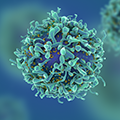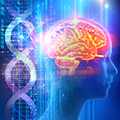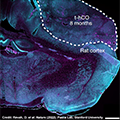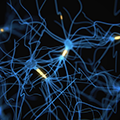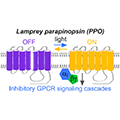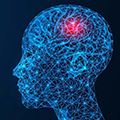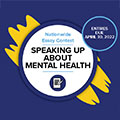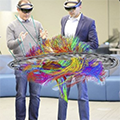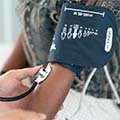Science Updates from 2022
- Barriers and Supports to HIV Prevention Among Young Women in Kenya
-
In a qualitative study supported by NIMH, researchers identified barriers and supports to Kenyan women’s use of PrEP, a highly effective medication to reduce HIV transmission.
- T Cells Help HIV Enter and Persist in the Brain
-
A recent NIMH-supported study sheds light on the role of a unique set of T cells in trafficking HIV infection into the brain and mediating the virus’ persistence there.
- Researchers Map the Genetic Landscape of Schizophrenia in the Brain
-
In a comprehensive postmortem genetic analysis of the caudate nucleus in the brain, NIMH-supported researchers identified many genes associated with schizophrenia risk, including a gene that regulates the flow of the chemical messenger dopamine.
- Dr. Elisabeth Murray Honored With Mika Salpeter Lifetime Achievement Award
-
Dr. Elisabeth A. Murray has been honored with the 2022 Mika Salpeter Lifetime Achievement Award from the Society for Neuroscience recognizing her distinguished career in biomedical research and dedication to mentoring future leaders in neuroscience.
- Rare Genetic Variation in 10 Genes Substantially Raise the Risk for Schizophrenia
-
In one of the largest genetic studies of its kind researchers funded by the National Institute of Mental Health identified variations in 10 genes that significantly raise the risk for schizophrenia—information that could help identify new treatment targets.
- Media Advisory: NIH’s Climate and Health Initiative Tackles Global Health Effects Associated With a Climate change
-
A coalition of leaders at NIH outline how the NIH Climate Change and Health Initiative is uniquely poised to lead and engage with communities and agencies globally to address the health effects associated with climate change.
- NIMH Turns Challenges into Opportunities
-
The recent NIMH Mental Health Services Research conference covered a range of topics, including mental health equity, policy, and funding.
- Researchers Develop Method to Study Brain Connectivity, Functionality
-
Scientists have developed a research method that allows for a much more detailed examination of the brain processes involved in some neurological and mental disorders.
- Family-Based Intervention Lowers Long-Term Suicide Risk in Youth
-
In a recent study supported by the National Institute of Mental Health, researchers examined the impact of a family-based intervention on suicide risk in youth and found risk-reduction benefits up to 10 years later.
- NIH Announces Winners of High School Mental Health Essay Contest
-
The National Institutes of Health (NIH) is pleased to announce the winners of 2022 Speaking Up About Mental Health! This Is My Story essay contest.
- NIH BRAIN Initiative Launches Projects to Develop Cell Atlases and Molecular Tools for Cell Access
-
The National Institutes of Health has launched two transformative projects supported by the Brain Research Through Advancing Innovative Neurotechnologies® (BRAIN) Initiative: The BRAIN Initiative® Cell Atlas Network and the Armamentarium for Precision Brain Cell Access.
- NIH Awards $100 Million for Autism Centers of Excellence Program
-
The National Institutes of Health has awarded a total of $100 million over the next five years to support nine Autism Centers of Excellence. This endeavor funds large research projects to understand and develop interventions for autism spectrum disorder.
- A Clinical Pathway for Suicide Risk Screening in Adult Primary Care
-
An NIMH-supported workgroup developed an evidence-based screening pathway to help primary care doctors identify adults at risk of suicide and bridge them to critical mental health services.
- Computational Methods Identify Psychosis Symptoms in Spoken Language
-
Researchers used computational methods to automatically detect abnormalities in spoken language that could be used to predict symptoms of psychotic disorders including schizophrenia.
- Toddlers’ Responses to “Baby Talk” Linked to Social, Cognitive, Language Abilities
-
In an NIMH-supported study, researchers found that toddlers respond to emotionally expressive speech in different ways, and these varied responses are linked with their social, linguistic, and cognitive abilities.
- Low Motivation for Social Bonding May Signal Behavior Problems in Early Childhood
-
In an NIMH-supported study, researchers found that low social affiliation—low motivation for social engagement and bonding—may be a precursor that identifies children as early as age 2 who are likely to develop callous-unemotional behaviors.
- Adult “Picky Eaters” Recall Helpful Parent Feeding Strategies
-
Researchers asked a group of self-identified adult “picky eaters” to reflect on their parents’ feeding strategies to better understand which strategies were helpful and which weren’t.
- Dr. Karen Lincoln Wins the 2022 James Jackson Memorial Award
-
Dr. Karen D. Lincoln wins the 2022 NIMH James Jackson Memorial Award in recognition of her excellence in mental health disparities research, mentorship, and community engagement.
- Feelings of Detachment After Trauma May Signal Worse Mental Health Outcomes
-
A new NIMH-supported study shows that experiencing persistent feelings of detachment following trauma is an early psychological and biological marker of worse mental health outcomes.
- Study Furthers Understanding of Disparities in School Discipline
-
A new NIMH-supported analysis shows that disciplinary disparities occur as early as preschool and that their effects can negatively influence how well students do in later years.
- Study Shows REACH VET Program Effective for Veterans at High Risk for Suicide
-
A recent NIMH co-authored study shows that a Department of Veterans Affairs suicide prevention program was associated with fewer inpatient mental health admissions and emergency department visits, and a 5 percent reduction in documented suicide attempts.
- Mindful Mood Balance Effective for Treating Residual Depressive Symptoms and Suicidal Ideation
-
NIMH-supported researchers have found an online mindfulness-based cognitive behavioral therapy—called Mindful Mood Balance—is effective at reducing residual depressive symptoms and at reducing suicidal ideation in those who experience these symptoms.
- Multistage Autism Screening in Early Intervention Settings May Reduce Disparities
-
An NIMH-supported study shows that incorporating a multistage screening process for autism spectrum disorder (ASD) into federally funded early intervention services may reduce disparities in early ASD diagnosis.
- Tool Uses Light to Inhibit Neural Activity in Mice
-
Researchers supported by NIH have developed a way to genetically insert a type of light receptor into neurons. The new technique enables the researchers to suppress the neuron’s activity using pulses of light.
- New Approach Allows Magnetic Brain Stimulation to Target Deep Brain Structures
-
TMS can only directly stimulate the outermost layer of the brain, but NIMH researchers have found that mapping a person’s brain architecture may make it possible to guide TMS to deep brain targets.
- Autism and Congenital Heart Disease Share Underlying Molecular Network
-
A recent study of gene networks may hold some promising clues about shared mechanisms underlying autism spectrum disorder and congenital heart disease, two physiologically distinct disorders that often co-occur.
- National Contest Encourages High School Students to Write Short Essays Exploring Mental Health
-
The National Institutes of Health invites students ages 16 to 18 years old to participate in the “2022 Speaking Up About Mental Health!” essay contest.
- Clinical Decision Support System Reduces Cardiovascular Risk in Patients With Serious Mental Illness
-
A new study shows the use of a clinical decision support system to prompt the use of shared decision-making tools, such as handouts, may result in positive impacts on long-term cardiovascular health in patients with serious mental illness.
- Personalizing Deep Brain Stimulation for Treatment-Resistant Depression
-
A recent NIMH-supported study investigated whether deep brain stimulation could be personalized for individuals with treatment-resistant depression.
- Women’s Experiences of Sexual Assault and Harassment Linked With High Blood Pressure
-
Women who had ever experienced sexual violence in their lifetime—including sexual assault and workplace sexual harassment—were more likely to develop high blood pressure over a seven-year follow-up period, according to an NIH-funded study.
- Machine Learning Study Sheds Light on Gaze Patterns in Adults With Autism
-
NIMH researchers examine what people with ASD and people without ASD look at when viewing a social scene.
- Dr. Robert Heinssen to Step Down as DSIR Director
-
In June 2022, Robert Heinssen, Ph.D., ABPP, will step down as director of the NIMH Division of Services and Intervention Research (DSIR) and transition to a new role as a senior advisor in the NIMH Office of the Director.

